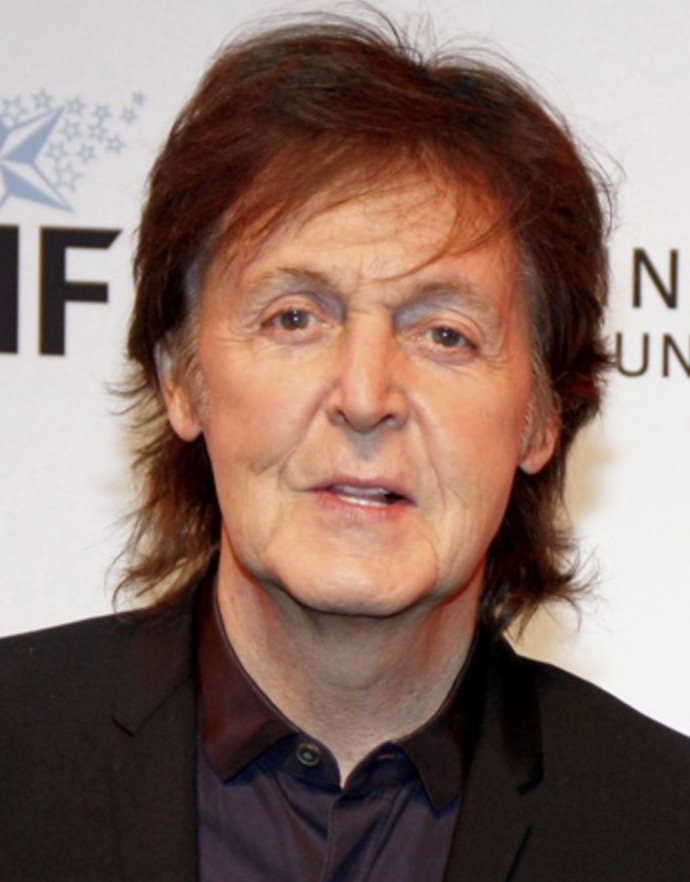
James Paul McCartney was born on June 18, 1942 into a musical family in Liverpool, England. His father, James McCartney was a jazz pianist and trumpeter. At a very early age, James Paul, who became known as “Paul”, showed an interest in music and taught himself to play the piano, guitar and trumpet.
In 1953, at the age of 11, Paul graduated from Joseph Williams Junior School in Belle Vale as one of only 3 students, in a class of 90, who passed the 11-Plus exam. This enabled him to attend the academic high school, Liverpool Institute, where students of high ability were streamed toward higher education.
The next year, during a bus ride to school, Paul met George Harrison, who would become the lead guitarist in his musical group in the years ahead. The rock and roll music craze that seized the American youth in the mid-1950’s swept across the Atlantic Ocean and reached a generation of English teenagers, among them Paul McCartney. On Paul’s 14th birthday in 1956, his father gave him his nickel-plated trumpet that Paul promptly traded for an acoustic guitar. It was on this guitar that he composed and sang his first compositions, one of which would become the famous, When I’m Sixty-Four.
On July 6, 1957, Paul met John Lennon who had a band known as the Quarrymen that played a variety of musical genres including rock and roll, jazz, and blues. Paul joined the Quarrymen as a rhythm guitarist and in the following year, George Harrison joined the group as the lead guitarist. By August 1960, the group had added Stuart Sutcliffe on bass and Pete Best (later replaced by Ringo Starr) as the drummer forming the group that became known as the Beatles.
In January 1962, Brian Epstein became the manager for the Beatles and 9 months later the Beatles had their first hit titled Love Me Do, that crossed the Atlantic to America. This was followed by a flurry of hits co-written by McCartney and Lennon, including I Saw Her Standing There, She Loves You, I Want to Hold Your Hand and Can’t Buy Me Love. These launched the craze known as “Beatlemania” that supplanted the American rock and roll of the 50’s with a new era in popular music.
In August 1965, the Beatles released McCartney’s composition Yesterday that featured a string quartet and incorporated some elements of classical music. The music for this iconic piece came to Paul McCartney in a dream, so vivid that he thought he must have heard it while conscious:
I was living in a little flat at the top of a house and I had a piano by my bed. I woke up one morning with a tune in my head and I thought, ‘Hey, I don’t know this tune – or do I?’ It was like a jazz melody. My dad used to know a lot of old jazz tunes; I thought maybe I’d just remembered it from the past. I went to the piano and found the chords to it, made sure I remembered it and then hawked it round to all my friends, asking what it was: ‘Do you know this? It’s a good little tune, but I couldn’t have written it because I dreamt it.’
By the mid 1960’s the Beatles, in what was termed “The British Invasion,” had become the face of popular music among the American youth. This dominance was in part a result of McCartney’s remarkable musical talent and innovation in writing and playing music. Then, in August 1967, the manager of the Beatles, Brian Epstein, died of a drug overdose at 32 years of age. Subsequently, Paul McCartney became the unofficial leader of the group, but individual differences among the group members led to a breakup of the Beatles by the end of the decade. The final legal dissolution of the Beatle organization occurred in January 1975.
Subsequently, Paul McCartney embarked on a solo career, creating with his new wife, Linda, a new band the band titled Wings that released a variety of hits during the 1970s, including, Band on the Run, Live and Let Die, and Jet. During this phase of his career in music, Paul continued to experiment with musical forms, borrowing from a variety of genres including the classical repertoire. He also collaborated with other icons of the music world, including Stevie Wonder, Michael Jackson, Kanye West and Rihanna. His work has continued to receive accolades, with albums like Chaos and Creation in the Backyard (2005) and Egypt Station (2018).
During his long and highly-productive career, Paul McCartney received numerous awards, including 18 Grammy Awards and two inductions into the Rock and Roll Hall of Fame (as a Beatle and as a soloist). He was knighted in 1997 for his services to music. McCartney’s influence on popular music and culture has been immense, earning him a place among the pantheon of modern music composers and performers.
